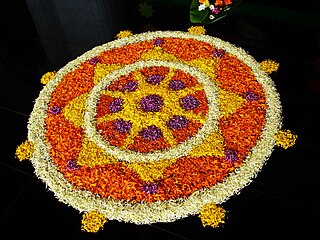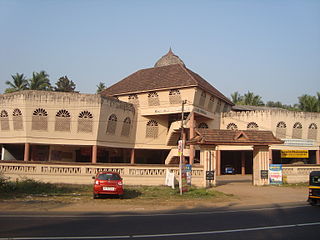
Onam is an annual Malayali harvest festival celebrated in the Indian state of Kerala. A major annual event for Keralites, it is the official festival of the state and includes a spectrum of cultural events. Drawing from Hindu mythology, Onam commemorates King Mahabali and Vamana.
The Malayali people are a Dravidian ethnolinguistic group originating from the present-day state of Kerala in India, occupying its southwestern Malabar coast. They are predominantly native speakers of the Malayalam language, one of the six Classical languages in India. The state of Kerala was created in 1956 through the States Reorganisation Act. Prior to that, since the 1800s existed the Kingdom of Cochin, the Kingdom of Travancore, Malabar District, and South Canara of the British India. The Malabar District was annexed by the British through the Third Mysore War (1790–92) from Tipu Sultan. Before that, the Malabar District was under various kingdoms including the Zamorins of Calicut, Kingdom of Tanur, Arakkal kingdom, Kolathunadu, Valluvanad, and Palakkad Rajas.

Mappila Muslim, often shortened to Mappila, formerly anglicized as Moplah/Mopla and historically known as Jonaka/Chonaka Mappila or Moors Mopulars/Mouros da Terra and Mouros Malabares, in general, is a member of the Muslim community of same name found predominantly in Kerala and Lakshadweep Islands, in southern India. Muslims of Kerala make up 26.56% of the population of the state (2011), and as a religious group they are the second largest group after Hindus (54.73%). Mappilas share the common language of Malayalam with the other religious communities of Kerala.

Oppana is a popular form of social entertainment among the Mappila community of Kerala, South India, prevalent throughout Kerala, especially in Malabar. The Term Oppana is believed to be originated from the Arabic word "Affna" Oppana was originated on the occasion of make of Muslim brides.. But in Kerala, this art form has been revived with much popularity on the performing stages of the Youth Festivals of the student community.

The culture of Kerala has developed over the past millennia, influences from other parts of India and abroad. It is defined by its antiquity and the organic continuity sustained by the Malayali people. Modern Kerala society took shape owing to migrations from different parts of India and abroad throughout Classical Antiquity.

Duffmuttu is an art form prevalent in the Malabar region of the states of Kerala and Karnataka in south India. It derives its name from the duff, a percussion instrument made of wood and ox skin. The word duff is of Arabic origin and is also called a thappitta.

The Indian state Kerala is well known for its diverse forms of performing arts. The various communities in Kerala contribute to its rich and colorful culture.
Mappila songs are a folklore Muslim song genre rendered to lyrics, within a melodic framework (Ishal), in Arabi Malayalam by the Mappilas of the Malabar region in Kerala, India. Mappila songs have a distinct cultural identity, while at the same time remain closely linked to the cultural practices of Kerala.

Kerala, a state situated on the tropical Malabar Coast of southwestern India, is one of the most popular tourist destinations in the country. Named as one of the ten paradises of the world by National Geographic Traveler, Kerala is famous especially for its ecotourism initiatives and beautiful backwaters. Its unique culture and traditions, coupled with its varied demography, have made Kerala one of the most popular tourist destinations in the world. Growing at a rate of 13.31%, the tourism industry is a major contributor to the state's economy.

Moyinkutty Vaidyar (1852–1892), often referred to as Mahakavi, is historically considered one of the most renowned poets of the Mappila pattu genre of Malayalam language.

Kondotty is a developing town, municipality, and aerotropolis in the Malappuram district state of Kerala, India which is located near Calicut International Airport, 24 km from Malappuram. It is the headquarters of Kondotty Taluk, which was declared as the seventh taluk in Malappuram district by chief minister Oommen Chandy on 23 December 2013.

Islam arrived in Kerala, the Malayalam-speaking region in the south-western tip of India, through Middle Eastern merchants. The Indian coast has an ancient relation with West Asia and the Middle East, even during the pre-Islamic period.
Valapuram is a small village which exists as a part of Kuruvambalam village. It is in Pulamanthole grama panchayath of Malappuram District, Kerala. It is situated on the banks of the Kunthipuzha River. The river separates Malappuram and Palakkad districts, a new bridge has been built across it at Valapuram. The nearest towns are Perinthalmanna(18 km), Valanchery (16 km), Pattambi (17 km), Pulamanthol (6 km), and Kulathur (5 km).

Variyankunnath Kunjahammad Haji sometimes called Variyamkunnan was the most prominent leader of the war in Malabar against the British during the Malabar rebellion and founder of a parallel government, in Malabar. He was an Indian freedom fighter, opposer of the Jenmi system and ordinary member of the Khilafat movement.
Vilayil is a small village in Kerala, India, near the cities of Kondotty, Kizhisseri and Areekode. The village is under the jurisdiction of the Muthuvallur and Cheekode Grama panchayats.
Kelunairpady is a location in Chokkad, Malappuram district, Kerala, India.

Puttamanna is a village in Kalikavu Panchayat, Nilambur taluk in Malappuram district in the state of Kerala.. It is situated 31 kilometres (19 mi) from Manjeri 36 kilometres (22 mi) from Perintalmanna and 9 kilometres (6 mi) each from Karuvarakundu and Tuvvur. A stream flows through the village, which is a tributary of the Chaliyar.
Poongode is a small village in Kalikavu Panchayat, Nilambur taluk in Malappuram district in the state of Kerala..
Ambalakkadavu is a village in Kalikavu. It is located in the north of Kerala state.
Vazhempuram is a location in Karakurussi Grama Panchayath in Palakkad district of Kerala.









